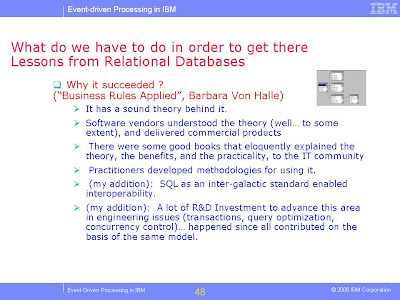2009-01-10T18:45:00.011+02:00
 Yesterday I participated in the "parents teaching" program in my third daughter's junior high (8th grade) and gave the children a short introduction to the issue - does a computer think ? I did not give them an answer for this question, but gave them several basic puzzles and explained them how we can teach a computer to solved them -- one of them has been the old good missionaries and cannibals problem.
Yesterday I participated in the "parents teaching" program in my third daughter's junior high (8th grade) and gave the children a short introduction to the issue - does a computer think ? I did not give them an answer for this question, but gave them several basic puzzles and explained them how we can teach a computer to solved them -- one of them has been the old good missionaries and cannibals problem.
 From the question --- does a computer think, I will move to the Blog of Hand Glide who phrased his posting in a form of a question -- CEP is a marketing device, so what does it say about CEP products ?
The answer is --- not much.
From the question --- does a computer think, I will move to the Blog of Hand Glide who phrased his posting in a form of a question -- CEP is a marketing device, so what does it say about CEP products ?
The answer is --- not much.
Let's change the TLA from CEP to SOA and ask the same question, the answer is that there are good and bad products that are marketed under the TLA of SOA, some of them have been here before SOA, and maybe some of them will be here if another TLA will dominate.
I have blogged before about the various interpretation of CEP, and the observation about what is called "CEP products" is that there is a variety of implementations that call themselves CEP, this does not teach anything about the quality of these products, their benefits to the business etc...
While TLAs became the property of marketing people to position products, somehow disciplines consist of one or two words such as: data management, image processing, graphics, information retrieval and many more - that's why I consistently use "event processing" when talking about the discipline.
Disciplines normally start in multiple places that try to solve similar (but not necessarily identical) problems, first generation of product is developed, and sometimes also hype is created and this is consistent with the "hype cycle" concept of Gartner. In the EPTS conference Brenda Michelson has argued that if anything this area is under-hyped and not over-hyped. There are some other indications that support her observation.
The early phases of a discipline lacks standard, agreed upon theory, and coherent thinking.
In the OMG meeting, March 2008, I have used the following slide as an example of what are the indications/conditions for a discipline to succeed:
 The fact that EP is not in the maturity level of relational databases or some other more mature discipline is obvious, however, while there are people who made a career out of criticizing and complaining that what other people are doing is not good enough, I think that our challenge is to advance ---- it took years until there was an agreement what a relational database is, during which all databases suddenly became relational (to anybody old enough to remember, there were some funny situations of products that claim to have relational extension, when they did not understand the term), we need an event processing manifesto, and a collection of standards, but they will not be constructed in a single day, so we also need patient and persistence... I believe that EP will be 10 years from now one of the major disciplines of computing, and that we have the challenge to get there...
The fact that EP is not in the maturity level of relational databases or some other more mature discipline is obvious, however, while there are people who made a career out of criticizing and complaining that what other people are doing is not good enough, I think that our challenge is to advance ---- it took years until there was an agreement what a relational database is, during which all databases suddenly became relational (to anybody old enough to remember, there were some funny situations of products that claim to have relational extension, when they did not understand the term), we need an event processing manifesto, and a collection of standards, but they will not be constructed in a single day, so we also need patient and persistence... I believe that EP will be 10 years from now one of the major disciplines of computing, and that we have the challenge to get there...
BTW - I agree with Hans that if products have business value for customers, they will be used regardless of the fact if at the end they will be classified EP or not. more - later
Source...